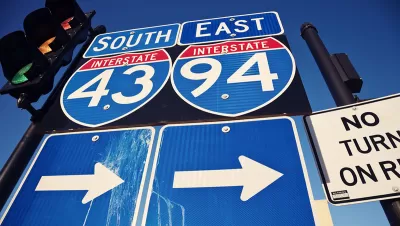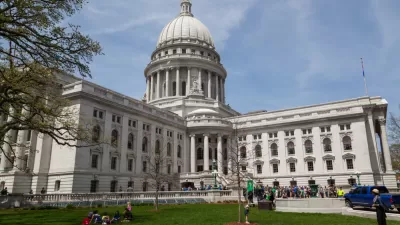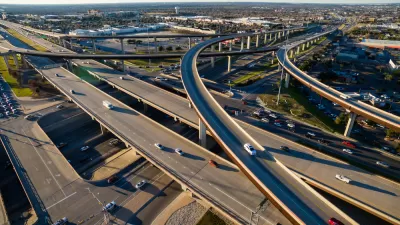A plan to save money on highway megaprojects is likely to backfire, experts warn.

Amid much controversy out of the Wisconsin Capitol this month, one wonky transportation bill has escaped the limelight: a requirement that highway megaprojects be funded with a minimum of 70 percent federal dollars.
Federal funding, of course, comes with federal requirements—specifically, the requirement to pay contractors the federal prevailing wage. The new law's goal, according to transportation experts interviewed by Wisconsin Public Radio, is "to concentrate federal funds into fewer highway projects," thereby limiting the total number of state projects that would have to pay a higher wage. Governor Walker signed the bill along with several others passed in the recent lame-duck session.
But multiple state offices, including the Wisconsin Department of Transportation, have concluded that it's not clear that avoiding prevailing wage would actually save the state money on transportation projects. Moreover, advocates say the requirement could end up delaying major projects and repairs that aren't able to achieve majority federal funding. Read or listen to the full story at Urban Milwaukee.
FULL STORY: Lame-Duck Bill Changes Highway Funding

Maui's Vacation Rental Debate Turns Ugly
Verbal attacks, misinformation campaigns and fistfights plague a high-stakes debate to convert thousands of vacation rentals into long-term housing.

Planetizen Federal Action Tracker
A weekly monitor of how Trump’s orders and actions are impacting planners and planning in America.

In Urban Planning, AI Prompting Could be the New Design Thinking
Creativity has long been key to great urban design. What if we see AI as our new creative partner?

Pedestrian Deaths Drop, Remain Twice as High as in 2009
Fatalities declined by 4 percent in 2024, but the U.S. is still nowhere close to ‘Vision Zero.’

King County Supportive Housing Program Offers Hope for Unhoused Residents
The county is taking a ‘Housing First’ approach that prioritizes getting people into housing, then offering wraparound supportive services.

Researchers Use AI to Get Clearer Picture of US Housing
Analysts are using artificial intelligence to supercharge their research by allowing them to comb through data faster. Though these AI tools can be error prone, they save time and housing researchers are optimistic about the future.
Urban Design for Planners 1: Software Tools
This six-course series explores essential urban design concepts using open source software and equips planners with the tools they need to participate fully in the urban design process.
Planning for Universal Design
Learn the tools for implementing Universal Design in planning regulations.
planning NEXT
Appalachian Highlands Housing Partners
Mpact (founded as Rail~Volution)
City of Camden Redevelopment Agency
City of Astoria
City of Portland
City of Laramie





























